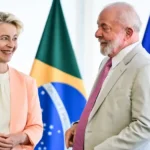
Letter obtained by the press reveals the UN’s concern with serious security and infrastructure failures during COP30, exposing the fragility of the Brazilian organization
The United Nations (UN) issued a harsh warning to the Brazilian government about the security failures and precarious structural conditions of the Climate Conference (COP30), held in Belém, Pará. In a letter sent on November 12, the executive secretary of the United Nations Framework Convention on Climate Change, Simon Stielldemanded that Brazil immediately present an action plan to correct problems that put both participants and the event’s reputation at risk.
The document, obtained by Bloomberg Newsreports a series of deficiencies ranging from safety incidents to issues related to excessive heat, failures in the air conditioning system and infiltrations caused by rain. Stiell stated that the conditions observed are incompatible with the standard expected for an international conference of this magnitude and demanded immediate measures from the host country.
The most scathing criticism was directed at the actions of the security forces during the invasion of the conference site, which took place on Tuesday night. According to the UN representative, about 150 protesters managed to enter the restricted area, damaging facilities and injuring security guards. Most worrying, according to Stiell, was the lack of reaction from authorities: “The security forces and command structure necessary to execute the security plan were all present on site during the incident, but did not act,” he wrote.
In the correspondence, the UN climate chief also stated that he had received information that the office of President Luiz Inácio Lula da Silva would have instructed the Federal Police not to intervene to disperse the protesters — something that, if confirmed, would represent a direct violation of the protocols signed with the international organization. He described serious vulnerabilities, such as unsecured doors, insufficient staffing and a lack of assurances that federal and state authorities would act in emergencies.
“This represents a serious violation of the established security structure,” said Stiell, adding that the episode raises “significant concerns” about Brazil’s fulfillment of its obligations as host country and president of COP30.
The letter was addressed to Rui Costachief minister of the Civil House, and the André Corrêa do LagoBrazilian diplomat who presides over the conference negotiations. To date, neither the federal government nor UN representatives have publicly commented on the case.
The situation is especially delicate for the president Lulawho has insisted on the importance of hosting COP30 in the Amazon, arguing that the event in Belém would serve to expose the concrete consequences of climate change to the world. The PT member rejected proposals to transfer the conference to larger cities, such as São Paulo or Rio de Janeiro, which have better hotel and logistics infrastructure.
But the reality on the ground has proven challenging. Foreign delegations and civil society representatives reported suffocating temperatures, long lines for food, water supply failures in bathrooms and unfinished pavilions. Furthermore, the internal payment system, based on a prepaid card, has generated dissatisfaction as it requires top-up and allows refunds only upon presentation of an identity document.
Stiell also pointed out serious flaws in the physical infrastructure of the spaces, highlighting the extreme heat and the poor functioning of the air conditioningwhich would have already caused health problems among participants and employees. The rains typical of the Amazon region worsened the situation: there were reports of leaks in the ceiling and light fixtureswhich, according to him, represents an electrical risk and threat to the integrity of those present.
The structural problems add to previous criticisms about the lack of affordable accommodation in the city. Delegations from small and developing countries have faced difficulties in sending representatives, which could undermine the balance of climate negotiations.
Over the past week, the absence of several international leaders has also drawn attention. Sources close to the organization say that logistical challenges and limited infrastructure weighed on some authorities’ decision not to attend the summit.
According to Stiell, discomfort among member countries is growing. Delegations that invested large sums in the construction of pavilions and renting offices expressed “serious concern about the poor condition of the facilities”. Some structures, according to the secretary, “are not within agreed standards”, and others “are simply not suitable for use”.
International pressure now falls on the Brazilian government, which has the challenge of restoring the UN’s trust and ensuring that COP30 — an event that should symbolize the country’s leading role in the global climate agenda — does not turn into a diplomatic embarrassment.
Belém, which was chosen as a symbol of the Amazon and the environmental struggle, faces the test of proving that it is capable of hosting one of the most important meetings on the planet on the future of the climate with safety and dignity.
With information from Bloomberg*
Source: https://www.ocafezinho.com/2025/11/13/onu-reclama-de-seguranca-e-mas-condicoes-na-cop30/

